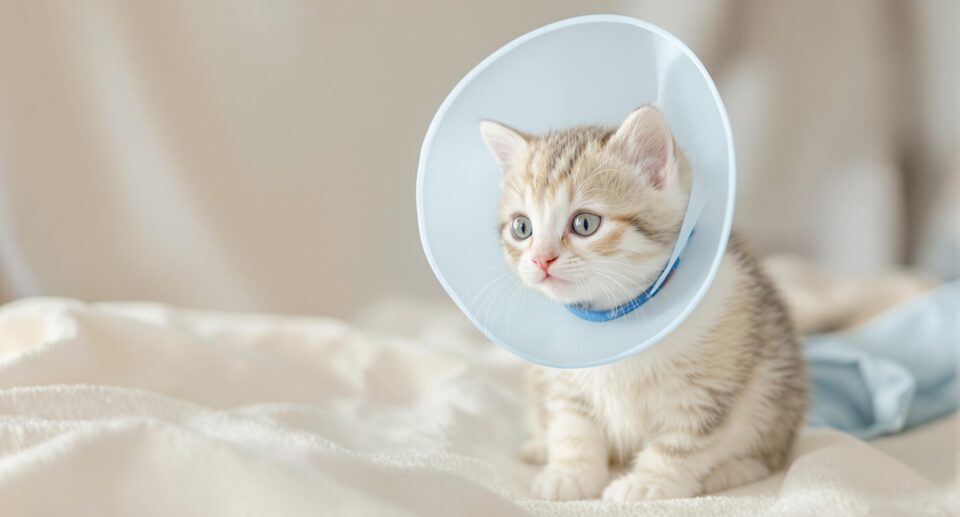How Old Do Kittens Have to Be to Get Fixed?

Key Takeaways
- Spaying or neutering your kitten between 4 and 6 months of age provides important health benefits and helps prevent unwanted behaviors.
- Fixing your kitten early also helps control pet overpopulation since cats can start reproducing as early as 4 months old.
- While some pet parents worry about early surgery, research shows that the benefits outweigh the risks, and most kittens recover quickly with proper care.
Each year, about 6.3 million animals enter shelters across the U.S., many of them the unexpected offspring of pets that haven’t been spayed or neutered. As a caring pet parent, deciding when to fix your kitten is one of the most important choices you’ll make for their long-term health and behavior.
Fixing your kitten at the right time can help prevent certain cancers, reduce the risk of infections, and minimize unwanted behaviors like spraying or roaming. Since every kitten is unique, it’s always best to work closely with your veterinarian to determine the ideal timing based on their age, size, and overall health. If you’re looking for reliable, vet-informed content to support your decisions as a pet owner, PetHealthMD is a trusted online resource for helpful articles and guidance.
The Right Time to Spay or Neuter Your Kitten
Most veterinary professionals recommend spaying or neutering your kitten between 4 and 6 months of age. This timeframe offers the best balance for a quick recovery and long-term health benefits.
Some shelters may perform the procedure as early as 6 to 8 weeks to help manage overpopulation, but for most pet parents, planning the surgery before 4 months is ideal—especially since female kittens can go into heat at that age. Taking action early helps prevent surprise litters and supports your cat’s overall well-being.
Your kitten’s individual development matters, too. In general, your kitten should be healthy and weigh at least 2 pounds before undergoing surgery. Male kittens often grow a little faster than females, but both benefit from having the procedure within the recommended window. Your veterinarian will assess your kitten’s growth, weight, and health to determine the best timing for surgery and ensure a safe, smooth experience.
The Benefits of Early Spay or Neuter Surgery
Spaying or neutering your kitten at the right age plays an important role in supporting their long-term health and behavior. It also helps prevent problems down the road, both for your pet and for the wider pet community.
Benefits of Early Spay or Neuter
- Significantly reduces the risk of mammary cancer in female cats—spaying before a kitten reaches 6 months can lower the risk by up to 91%, offering much greater protection than waiting until later.
- Eliminates the risk of testicular cancer in males and protects females from serious uterine infections like pyometra, both of which can be life-threatening if left untreated.
- Helps curb unwanted behaviors in males, such as territorial marking, spraying, and roaming, making them more relaxed and easier to live with.
- Encourages stronger bonds with people and other pets, leading to more affectionate and social cats who are better adjusted to household life.
- Plays a crucial role in preventing accidental litters, especially since kittens can start reproducing as early as 4 months old.
By choosing to neuter your kitten early, you’re giving them a healthier start in life while also helping to reduce the number of homeless animals in shelters.
For ongoing protection and care, explore cat health and wellness products to support your kitten’s recovery and long-term well-being.

Potential Risks and Considerations
While early spaying or neutering offers many health and behavioral benefits, it’s also important to understand the potential risks and talk them over with your veterinarian. Knowing both sides can help you make the best decision for your kitten’s long-term well-being.
Possible Risks
- Slight increase in urinary tract issues: Some studies suggest that kittens fixed before 4 months of age may have a slightly higher risk (about 3–5%) of developing urinary tract problems later in life.
- Possible weight gain: After the procedure, some kittens may be more prone to gaining weight. This can usually be managed with the right diet and regular activity. Your vet can help you set up a plan that keeps your kitten at a healthy weight.
The benefits of spaying and neutering outweigh these potential risks, and most kittens bounce back within 24–48 hours after surgery. By following your vet’s post-op instructions, you can ensure your pet’s smooth and comfortable recovery.
Understanding the Spaying and Neutering Process
As a pet parent, you want to make the best choices for your kitten’s health and happiness. Spaying or neutering is an important step, and it’s natural to have questions. Here’s what you need to know to feel more confident about the process and what to expect.
When Should I Schedule My Kitten’s Spay or Neuter Appointment?
Most veterinarians recommend scheduling the procedure when your kitten is between 4 and 6 months old. Some clinics offer safe options as early as 8 weeks, as long as your kitten is healthy and weighs at least 2 pounds.
What’s the Difference Between Spaying and Neutering?
Spaying is the procedure for female kittens and involves a small incision in the abdomen to remove the reproductive organs. Neutering is for males and is a quicker procedure with tiny incisions, so male kittens often recover a bit faster.
Will the Surgery Affect My Kitten’s Growth or Development?
Not at all. Studies show that spaying or neutering at the recommended age doesn’t interfere with healthy development. Your kitten will continue to grow strong and stay just as playful—only with added protection against future health issues.
How Should I Prepare for Surgery Day?
Your vet will give you detailed instructions, but most kittens should skip breakfast the morning of surgery. It’s also a good idea to set up a quiet, cozy spot at home for them to rest and recover comfortably after the procedure.
How Can I Help My Kitten Post-Surgery?
Your kitten needs extra love and attention while healing from their spay or neuter surgery. Create a peaceful recovery nest in a quiet corner of your home, away from other pets. Keep their food, water, and litter box within easy reach. During the first 24 hours, your drowsy little one might feel extra sleepy from the medicine used during surgery.
Most kittens start feeling like themselves within a few days, but complete healing takes 10–14 days. During this time, gentle care makes all the difference. Make sure you follow your vet’s after-surgery care instructions, including any medicine schedules.
Empowering Pet Owners for a Healthier Tomorrow
Making informed choices early on—like spaying or neutering at the right time—can have a big impact on your kitten’s long-term health and behavior. Research shows that early neutering helps lower the risk of serious health issues, including mammary tumors, and can lead to a calmer, more well-adjusted pet. It also helps reduce unwanted behaviors like spraying and roaming, making life more peaceful for both you and your pet.
Your veterinarian will help you decide on the right timing based on your kitten’s weight, overall health, and individual needs. By taking these proactive steps early on, you’re setting your kitten up for a lifetime of health, happiness, and companionship.
When it comes to giving your kitten the best care possible, 1800PetMeds is a trusted source for vet-approved medications, supplements, and supplies.





